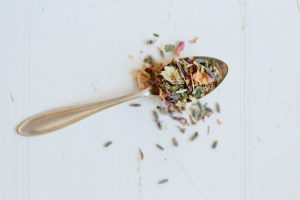The Naturopathic Co.

You're using an outdated browser. Please upgrade your browser to improve your experience.
A regular menstrual pattern requires balanced and functioning hormones, which involves the function of the hypothalamus, anterior pituitary gland, ovaries, and uterus.
There are different phases within the cycle, the first phase (days 1-5) is the Menstrual Phase.
In the uterus, declining levels of progesterone stimulate the resulting release of menstrual flow. The uterine lining which built up during the previous cycle is shed.
The lining of the uterus starts to thicken again. At this time, the hypothalamus signals to the pituitary gland to release a hormone called follicle-stimulating hormone which stimulates the ovaries to produce immature eggs. The maturing of one of these eggs triggers a surge in oestrogen.
Oestrogen levels reach their highest level which signals the pituitary gland to release luteinising hormone which starts the process of ovulation. This phase occurs around days 12-14 of the cycle.
Progesterone is released for approximately 2 weeks after ovulation, which causes the uterus to remain conducive to the implantation of a fertilised ovum. Progesterone causes oestrogen levels to drop, and it then results in the menstrual phase again if fertilisation does not take place.
It can be difficult to determine what “normal” is, but your period can tell you a lot about your health.
There are many factors that can affect menstruation, such as exercise, weight loss, stress, and birth control.
The normal menstrual cycle is defined as 28 days (+- 7 days) in length and 4-7 days (+- 2 days) in duration, with a blood loss of 30-40mL, and women generally maintain consistencies each month based on genetics and hormonal status.
The amount of blood that is lost during your period may vary slightly month to month, however menorrhagia is measured blood loss of 80mL or more per cycle. Possible causes of abnormal menstrual bleeding sexually transmitted diseases, endometrial polyps, uterine fibroids, intrauterine devices (IUD), ectopic pregnancy, and endometriosis. If you feel your period if heavy or heavier than usual, it’s important to investigate the reason why.
Mild cramps at the onset of your period are common, however severe or prolonged cramping is not. Cramps should not feel like stabbing pain. If your cramping interrupts daily activities then talk to your practitioner.
Periods can last for 2-7 days, but if your period lasts longer than 7 days, then speak to your practitioner as it requires investigation. Long-term heavy or prolonged cycles can lead to iron deficiency or be a sign of an underlying condition or hormonal imbalance.
Cycles shorter than 21 days or longer than 35 days warrant investigation.
If your period is irregular, there are a number of reasons why that can be the case. It’s important to investigate irregularity as periods ‘should’ remain relatively constant within the cycle in terms of length and duration.
Small clots are considered a normal component of menstrual bleeds. They indicate excessive blood flow whereby anticlotting factors cannot keep the blood fluid. Iron status should be considered for larger sized clots, as well as endometriosis if the clots are large, dark coloured, and cause pain or discomfort.
PMS is characterised by recurring somatic and psychological symptoms during the luteal phase of the cycle that are relieved within a few days of menstruation. Symptoms of PMS can include bloating, acne, anxiety, fatigue, irritability, food cravings, an increased appetite and many more. There are some things you can do to help balance hormones and minimise PMS symptoms so speak to your practitioner if your PMS symptoms have intensified or are causing problems for you by impairing your daily function.
As hormone levels fluctuate in the week before and during your menstrual cycle, it is natural to have cravings for certain kinds of food. However, giving in to these cravings for a week every month and indulging in high-sugar, high-salt packaged foods, can wreak havoc on your body. Some ideas for better options for sweet treats that cut out the processed and refined sugar could be: 80%+ dark chocolate, bliss balls, sweet potato brownies, kombucha, home made popcorn, nut butter filled dates.
Are there any recent changes to your menstrual cycle?
How long do you bleed for, and how heavy is your flow (how often do you need to change your tampon/pad/menstrual cup.
What is the colour of your menstrual blood?
Do you experience any clots in your menstrual blood, and if so what size and colour are they?
Do you experience any spotting?
Do you experience any pain with menstruation? How severe is the pain.
Do you experience any bowel changes prior or during your period?
Do you experience PMS (mood changes, cravings, fluid retentions, cramping, headaches, skin changes)
If you have any concerns about any of the above, or if you feel you have a symptom of your cycle which warrants investigation or discussion, then put your mind at ease and schedule a consultation with your naturopath.
Yvette is a qualified Melbourne-based Naturopath and Nutritionist, MINDD Practitioner, member of the Naturopaths and Herbalists Association of Australia, and Complementary Medicine Association. Yvette specialises in the treatment of conditions commonly affecting women and children, with a key interest in children’s digestive and neurological conditions, as well as women’s hormonal concerns, digestive issues, fatigue, anxiety, and skin concerns. Yvette consults in South Yarra, Melbourne, as well as Australia-wide via skype/zoom/phone.
The Naturopathic Co. Melbourne Naturopath 2020
Comments are closed.